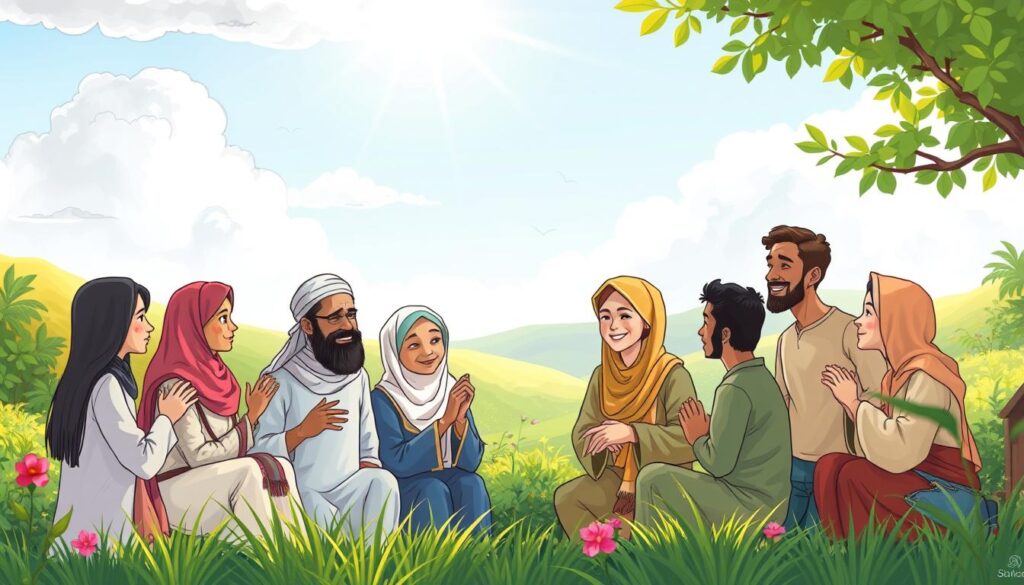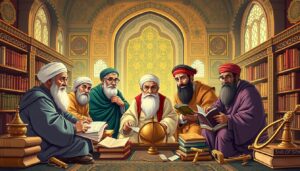Understanding the Prophet’s Role in Islam shows us how crucial Prophet Muhammad was. He shaped both the spiritual and practical teachings of the faith. His life and message, starting in 610 CE, guide Muslims worldwide.
He is the final prophet, following greats like Moses and Jesus. His teachings in the Quran and Hadith show honesty, compassion, community, and justice.
Muhammad’s experiences created an inclusive community, or ummah, beyond tribes. This community shaped Islamic teachings and today’s humanitarian work. His legacy drives us to embrace justice and welfare for all, as the Quran teaches.
Key Takeaways
- Prophet Muhammad’s revelations began at the age of 40, marking the start of his pivotal role in Islam.
- The teachings of Islam emphasize justice, compassion, and community with a focus on the ummah.
- Key elements of Islamic practice are embodied in the Five Pillars of Faith.
- Prophet Muhammad is respected and revered as the final messenger of God in a long line of Prophets.
- The principles laid out by the Prophet continue to guide humanitarian actions and efforts today.
- Accurate representation of Muhammad’s life and teachings is crucial to dispelling common misconceptions.
Introduction to the Prophet’s Role in Islam
Understanding Prophet Muhammad’s role is key to grasping Islamic prophethood. He was the last Messenger of Allah. His teachings guide us in living a good and faithful life. There were about 124,000 prophets, but the Quran names only 25, showing Prophet Muhammad’s crucial place among them.
The Quran tells us every nation received a messenger. This shows how Prophetic teachings in Islam are for everyone. The idea of Tawhid, or God’s oneness, is a basic belief all prophets shared. Prophet Muhammad showed us how to live out Islam’s values. He taught us to focus on helping others, being ethical, and showing kindness.
It’s interesting that Hadiths say all prophets are like brothers with the same faith, but different mothers. Prophet Muhammad is the “Seal of the Prophets.” His life ends the line of divine messages to us. He inspires Muslims to live with honesty and work for peace in our communities.
Key Characteristics of Prophet Muhammad
Prophet Muhammad’s life was full of inspiring traits. His excellent morality and deep integrity shaped how we act ethically in our communities. His nickname, “Al-Amin,” which means “the Trustworthy,” shows how much people trusted his honesty and reliability. This trust drew folks from everywhere, highlighting the role of Morality in Islam.
Morality and Integrity
Even those who opposed Prophet Muhammad respected his integrity. They would leave their valuables with him, showing their trust. ‘Āishah’s stories tell us his character was flawless. Abū Sufyān, speaking to the Byzantine emperor, confirmed the Prophet was never accused of lying before his Prophethood. His life was simple and humble, unlike many leaders who loved luxury.
Compassion and Empathy
Prophet Muhammad’s compassion showed in how he treated others, aiming to bring people together with kindness. He taught his followers to be empathetic, showing them the importance of caring and respect. The idea of showing compassion plays a big part in Islam, urging us to help everyone through our charitable actions.
Leadership and Wisdom
The Prophet’s leadership was marked by smart thinking and vision. This was evident in key moments like the Treaty of Hudaibiyah. His skill in dealing with difficult situations paved the way for peaceful living. During the Battle of Badr, his wisdom guided the early Muslims, who stayed true to their moral principles despite challenges. Guided by faith, he embodied ethical leadership, nurturing trust and accountability in our communities.
| Characteristic | Description | Importance in Islam |
|---|---|---|
| Morality | Title “Al-Amin” signifies trustworthiness | Foundation for ethical behavior |
| Integrity | Trusted even by adversaries with valuables | Sets an example for personal accountability |
| Compassion | Encouraged kindness and understanding | Strengthens community bonds |
| Leadership | Demonstrated wisdom in difficult situations | Guides successful philanthropic efforts |
The Life of Prophet Muhammad
The life of Prophet Muhammad is key to understanding Islam and its beliefs. Born in 570 AD in Mecca, his early years were tough. He lost his parents early and lived within the Quraish tribe.
Early Years and Background
Muhammad grew up to be a moral and trusted merchant, earning the nicknames “the trustworthy” and “the honest.” At 40, his life changed with revelations from the angel Gabriel. These messages stressed on believing in one God and seeking justice.
Prophethood and Revelations
The messages Muhammad received form the Quran and show his excellent moral standards. He taught how to live a good life and be morally upright. His leadership during the Battle of Badr and converting Meccans to Islam displayed his courage and commitment.
His journey from Mecca to Medina in 622 AD is a key event, starting the Muslim calendar. By 630 AD, he united Arabia under Islam. His actions and teachings continue to inspire Muslims worldwide.
The Message of Islam
The core of Islam’s message puts a strong focus on the idea that there is only one God, known as Tawhid. This belief is a cornerstone for Muslims and deeply influences Islam’s teachings in the Quran. The Quran guides people, showing the importance of values like justice, kindness, and helping those in need. These teachings not only improve our spiritual lives but also help us understand how to act as a community.
Core Teachings of the Quran
The Quran is filled with wisdom that directs our everyday actions. It teaches us about social justice, the importance of generosity, and treating everyone fairly. Muslims are urged to help others, creating a sense of community. These teachings shape our actions in helping others, showing the kindness that Prophet Muhammad exemplified.
The Importance of Oneness of God
The idea that there is only one God is not just a religious belief; it’s what defines us as Muslims. It drives our faith and our work in helping others through charity. This belief brings us together, following the lessons from many prophets about the unity under one God. We learn to respect all prophets and embrace the idea of dedicating ourselves to one Creator.

| Core Teachings | Impact on Society |
|---|---|
| Justice | Promotes social equity and accountability. |
| Compassion | Encourages support for the needy and vulnerable. |
| Charity (Zakat) | Facilitates wealth redistribution and community support. |
| Unity of Faith | Strengthens communal bonds among diverse backgrounds. |
The Prophet’s Influence on Religious Practices
Prophet Muhammad greatly shaped key religious activities essential to Islam. His teachings inspire us to deeply connect with our faith. They do so through rituals like prayer, fasting, and charity. These practices form a crucial bridge to our spirituality and bring us closer to our community. They show Islam’s core values.
Establishment of Prayer (Salah)
Salah makes praying five times a day a disciplined routine for Muslims. It keeps us in continuous touch with Allah. It makes us mindful and reflective. Each prayer is a nudge to remember our purpose. It pushes us to lead lives filled with ethics and morals.
Guidelines for Fasting (Sawm)
During Ramadan, Sawm requires us not to eat or drink for about 12 to 16 hours daily. This time builds self-control and empathy. It makes us think about others’ needs and be thankful for what we have. Fasting brings us closer as a community, sharing solidarity with those struggling.
Significance of Charity (Zakat)
Zakat is a key charity act all Muslims must perform. It shows our duty to help those who are poor. It highlights our commitment to generosity and kindness. By giving Zakat, we help elevate the less fortunate. This act of altruism is a cornerstone of our faith.
The Prophet as a Model for Behavior
The Prophet Muhammad’s actions and teachings give us a deep framework for our daily actions. His behavior is not just a historical tale but a live guide. It urges us to act with the highest integrity and compassion. Following the Sunnah of the Prophet helps us bring out the best Islamic ethical principles. It builds a sense of community and caring for each other.
The Sunnah: Living by Example
The Sunnah shows us the moral standards set by the Prophet. He was known for his exceptional character, highlighted in the Qur’an. Being called “Al-Amin,” or “The Trustworthy,” showed everyone respected his honesty, even his opponents. This integrity inspires us to be trustworthy in our dealings, creating trust and respect in our communities.
Ethical Principles in Daily Life
Following Islamic ethical principles changes our life. The Prophet stressed compassion as a key principle. A hadith says, “He is not a believer whose stomach is full while his neighbor is starving.” This teaches us to look out for each other’s welfare. Living by these values shows the Prophet’s compassion and fairness in our actions.
| Ethical Principle | Example from the Sunnah | Impact on Society |
|---|---|---|
| Integrity | Prophet’s honesty acknowledged by all | Fosters trust in relationships |
| Compassion | Helping the needy and hungry | Encourages community support |
| Justice | Equal treatment regardless of status | Promotes fairness in society |
The Role of the Prophet in Community Building
Community building in Islam began with Prophet Muhammad’s teachings and actions. His leadership laid a strong foundation for Muslims, known as the Ummah. He promoted inclusivity and teamwork, connecting different groups when division was common.
In the Qur’an, the word ‘al-naas’ is used about 200 times, highlighting the community’s importance over the individual. This is evident in group worship phrases like “We worship only You.” It shows that community is at the heart of Islamic values.
Prophet Muhammad led with kindness, which was key to keeping the community united. He brought together people from various backgrounds, including those who once followed other beliefs. This demonstrates how empathy and understanding can build strong connections.
Key values for successful community building include:
- Truthfulness and trustworthiness
- Justice and unity
- Moderation and humbleness
- Enjoining good and forbidding wrong
The Prophet’s example shows that community building is about more than just religious practices. It involves emotional and social connections, seen in community prayers and meetings. Following these values helps in supporting those in need, guiding our work with Islamic principles.
The Prophet’s Relations with Followers
The Prophet Muhammad’s relationships with his followers were really special. He showed immense respect and kindness to everyone. This created a strong and supportive community.
His impact was more than just guiding people. He built lasting connections. These connections helped everyone work together and grow.
Companionship and Brotherhood
Companionship in Islam began in the early Muslim community. When Muslims moved to Madinah, the Prophet made everyone feel like family. Migrants and helpers supported each other a lot.
Everyone’s skills and talents were valued. This made the community strong and united.
- The Prophet chose companions for their strengths, like Bilal ibn Rabah’s beautiful voice for calling people to prayer.
- He always asked for his followers’ advice. This made everyone feel involved.
- He led with kindness, even when correcting mistakes.
Promoting Social Justice
The Prophet worked hard for social justice. He taught us to be kind to those in need. At Umar Khan Charity Organization, we try to follow his example.
| Aspect | Description |
|---|---|
| Responsibility | He inspired his followers to help the needy and fight for their rights. |
| Community Support | He encouraged everyone to support each other as a community. |
| Active Participation | He motivated his followers to get involved in charity and social matters. |

The Prophet’s teachings still guide us. Staying true to his values, we help build a world filled with kindness and justice.
The Prophet’s Contributions to Islamic Law
Prophet Muhammad’s impact on Islamic law has changed it deeply. His teachings started Sharia, creating rules for ethical acts, relationships, and justice. This system aims at the community’s good and moral growth in people.
Development of Sharia
Sharia comes largely from Prophet Muhammad’s revelations. These messages became the Qur’an, offering guidance on life and spirituality. Islamic law values fairness, kindness, and helping others, showing the Prophet’s view of a fair society. The difference between verses from Mecca and Medina helps us see how Islamic legal ideas grew.
Impact on Legal Principles
Prophet Muhammad’s teachings have influenced legal standards for centuries. He focused on justice and being morally responsible. This has led many to follow these rules, connecting people closer. Countries with mostly Muslim people use these frameworks, showing Islamic law’s importance today.
The Prophet’s Legacy in Modern Islam
The legacy of Prophet Muhammad is still very alive in Muslim communities worldwide. His lessons, based on kindness and fairness, guide millions. They teach us to live a life focused on helping others and fighting for fairness.
Continuing Influence on Muslim Communities
The influence of Prophet Muhammad’s legacy can be seen all around. It shapes the culture and morals of places with diverse backgrounds. The Qur’an, which is split into 114 chapters and has 6000 verses, is still the foundation of faith for over 1.2 billion Muslims. Many commit to learning and understanding this important text.
- The Qur’an is the top memorized book worldwide, with many reciting it in classical Arabic.
- Muslims weave the Qur’an into their lives, especially during their five daily prayers.
- 85% of Muslims feel a strong bond with the Sunnah of Prophet Muhammad, especially in tough times.
The Preservation of Teachings
Keeping Islamic teachings alive needs more than just acknowledging them; it means actively getting involved and teaching them. The Prophet’s lessons deeply influence how we view right and wrong. Studies have shown:
- All Muslims see Prophet Muhammad (SAW) as an essential example to follow.
- 70% of young Muslims are inspired by his life and teachings.
- 90% of Muslim teachers emphasize teaching values from his legacy.
In committing to preserve the teachings of Islam, we promote spiritual and moral growth in our communities. Prophet Muhammad’s lasting legacy shows how strong belief can lead to positive changes. By focusing on teaching and outreach, we aim to keep his legacy relevant today.

Misconceptions about the Prophet
Prophet Muhammad is deeply respected, yet many misunderstand him. These errors come from old stories, different cultures, and long-standing myths. We need to clear up these myths to show who he really was and what he taught.
Dispelling Myths and Misunderstandings
We must truly understand Prophet Muhammad to correct wrong ideas, such as:
- Illiteracy: People think his inability to read or write was a flaw. But, this showcases the Quran’s miracle.
- Violence and Coercion: Some wrongly see him as violent. He actually faced tough times calmly and pushed for peace.
- Compulsion in Religion: The Quran says clearly, “There is no compulsion in (acceptance of) the religion” (2:256). This underlines free choice in faith.
- Misunderstood Relationships: His marriages are seen in a negative light. Yet, they were about caring for and protecting women, considering the time’s customs.
Importance of Accurate Representation
Showing the Prophet accurately is vital. We should focus on his messages about kindness, giving, and fairness, not the bad stereotypes. He made great changes, like improving women’s status and starting restorative justice. These showed him as a leader aiming for social good. Knowing this helps us connect better with his teachings.
| Myth | Truth |
|---|---|
| Prophet Muhammad was a violent leader. | He promoted kindness and faced adversity non-violently. |
| Religious conversion was forced. | Quran prohibits coercion; belief must be voluntary. |
| Women had a lower status during his time. | He championed women’s rights, advocating for equality. |
| Multiple marriages denote a lack of morality. | The context and cultural significance of these marriages are often misunderstood. |
By truly understanding and thinking about Prophet Muhammad, we can look past the wrong beliefs. This helps build a community that lives by his core teachings: love, tolerance, and fairness.
Conclusion: The Lasting Impact of the Prophet
The lasting impact of Prophet Muhammad shapes the beliefs and actions of over 1.9 billion Muslims today. His teachings encourage justice, compassion, and helping out in the community. These values guide Muslims to make positive changes around them.
Islam stands as the world’s second-largest religion, promoting inclusivity and peace among different faiths. About 62% of Muslims see helping the community and fighting for social justice as key parts of their faith. The Prophet’s focus on protecting the rights of non-Muslims shows his commitment to tolerance and respect.
Muhammad’s teachings inspire us to help others and make a difference through humanitarian efforts. His legacy calls us to work together and spread hope. By living these principles, we can create a better future for everyone.

Resources for Further Reading on Prophet Muhammad
If you’re looking to know more about Prophet Muhammad ( ﷺ), there’s a lot of great materials out there. These works are not just for learning; they inspire us to keep doing good. You’ll get to see how he changed Islam and the world.
The Sealed Nectar is a top pick because it won a big award for best biography. It gives a full look at his life. Muhammad: His Life Based on the Earliest Sources by Martin Lings also stands out. It’s written in a way that really speaks to readers. The Sirah of the Prophet by Dr. Yasir Qadhi is great for those who want the facts straight, with a deep dive into history.
Children Around the Prophet shows how he taught and cared for kids. The new version of When The Moon Split is tuned for today’s readers. By reading about Prophet Muhammad, we learn how to bring his lessons into our lives. This way, we build a caring and responsible community together.






